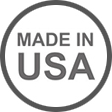
Let’s start at the top and review what collagen is and why you should care about it.
Collagen, The Glue That Holds Us Together

Collagen is a protein that is found in pretty much every part of our body – in our bones, tendons, ligaments, skin, muscles, cartilage, lining of digestive organs, and more. In fact, the only thing our body has more of than collagen is water!
Don’t go looking for collagen in tofu or peanuts, collagen is a protein found only in animals. Yep, us humans – we are one of those animals who have collagen all over our body.
As with all proteins, collagen is made up of amino acids. We will get more into the exact amino acid profile of collagen later, but for now, just file in the back of your brain that collagen is rich in three key amino acids – glycine, proline, and hydroxyproline.
What Does Collagen Do For You?
You have probably seen all the headlines...

The best way to understand how collagen helps our body is to explain how well our body functions when we have plenty of collagen.
Why not start with the skin…
 Skin
SkinCollagen gives your skin strength and elasticity. 70% of the protein in your skin is collagen. In addition, you know that cellulite we all hate? Well, cellulite becomes a problem when fibers in the skin break down and the cellulite is pushed up to skin level. Collagen can repair those skin fibers and in effect push cellulite down and stop it from showing on your skin. Beautiful skin from the inside out.
 Hair
HairDid you ever wonder how your hair got nutrients? Each bulb of hair on your head is surrounded by a sheath of collagen with tiny micro vessels that deliver nutrients. Having plenty of collagen is the key to keeping your hair nutrient rich and therefore thick, shiny and healthy.
 Muscles
MusclesCollagen is made up of amino acids like we mentioned earlier and these amino acids are the building blocks of muscles and pretty much every other part of our body. The amino acid Proline plays a key role in the repair and production of muscles. When our body is rich in collagen (a protein) it has the resources it needs to build, repair, and retain muscles. Don’t forget, the heart is a muscle as well!
 Joints
JointsWhat is the key to joint health? Healthy cartilage. I bet you can never guess what is in cartilage? That’s right – collagen, and more specifically Type II collagen. If you want to avoid painful knee, wrist, elbow, and hip joints, we need to have plenty of collagen in the body and joints.
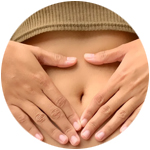 Digestive System
Digestive SystemGlycine, an amino acid found in collagen plays an important role in our digestive health. Glycine helps with the production of bile in the gallbladder and balances your acid-base ratio in your digestive track.
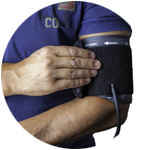 Brain, Heart, and Central Nervous System
Brain, Heart, and Central Nervous SystemOnce again, it is collagen's amino acids that play a crucial role. Proline Glycine builds healthy DNA and RNA strands, effecting the whole body. Research shows Glycine can help you sleep longer and in a more restful state.

Truth Be Told: There Are Actually Many Types of Collagen

There are several kinds of collagen that exist in the body - nearly 16 of them! However, proportionately there are three main types that make up the vast majority of collagen you have at your disposal - Type I, II, and III are the main players when we think of collagen in the body.
Type I Collagen is the most abundant collagen in the body, with Type III being the second most abundant collagen in the body. Both Type I and Type III are very similar and help with skin health, digestive issues, ligament, muscle, and joint issues, brain health, energy, sleep, metabolism, and more. Type I and Type III are found all over the body, with the exception of our cartilage. Cartilage is where Type II Collagen is found.
Type II Collagen can be great if you have a very specific condition. If you have an injury that is specific to your cartilage, perhaps a knee injury, then taking Type II for that cartilage injury can be beneficial. Therefore, Type II Collagen is more about providing a solution to a specific problem involving the cartilage and perhaps arthritis - something you might take in a specific case, for a specific period of time until the problem is corrected.
On the other hand, Type I and III Collagen is something everyone can take on a daily basis and see long term benefit to multiple areas of the body.
A Little North of 20? Let’s Discuss How You Can Get More Collagen

Do you see a bison running by you? If so, tackle it and start gnawing on its bones.* Eating a steak? Don’t give the bones to your dog, that’s where all the collagen is.
Turns out, we have moved away from a diet rich in bone broths and animal tendons - where the collagen resides. Certain diets such as the Paleo and the Weston A. Price Diet definitely put a much higher emphasis on bone broths and getting ample collagen in your diet.
Even if you do consume more than your fair share of bone broth, the way the bones are processed and the food that the animal ate all play a role in determining how much collagen actually makes it into your diet. When you eat collagen from the bones of an animal, that collagen will only be as nutrient dense as the diet of the animal. A cow that has been locked in a stall all day and fed corn or grain is not going to produce the same collagen as a pasture raised cow who grazes on grass.
To make matters worse, what about cows who have been fed feed that is treated with pesticides and hormones – do you really want to have collagen from this type of animal?
*Warning: Do not attempt to tackle a Bison. Bison, or for that matter, really any animals don’t take kindly to being tackled... unless you are playing football with them and they have a clear path to the endzone. But that begs the question, would you really eat a player from the opposing football team?
Two Choices For Increasing Collagen In Your Diet
We believe there are just two viable choices if you want to increase the collagen in your diet.
 The first is make or buy bone broth that is made from only pasture raised, grass-fed animals that have not been touched by pesticides or hormones.
The first is make or buy bone broth that is made from only pasture raised, grass-fed animals that have not been touched by pesticides or hormones.  The second choice is to buy a high quality collagen or gelatin supplement, that is made only from pasture raised, grass-fed cattle that have not been touched by pesticides or hormones.
The second choice is to buy a high quality collagen or gelatin supplement, that is made only from pasture raised, grass-fed cattle that have not been touched by pesticides or hormones.We are all for getting the vast majority of our nutrients from whole foods. This is the idea behind the Paleo and Weston A. Price eating plans, and we fully support this philosophy. If you can have bone broth, from grass-fed, organic cows everyday – that is a great way to go. In the crazy, hectic life that we all lead these days, it can be a challenge to have bone broth on a daily basis. For this reason, taking a collagen supplement can be an easy way to get some additional collagen into your family’s diet.
Then there is this whole Triple Helix thing...
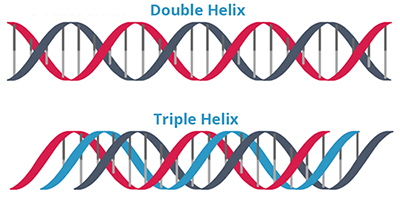
A Triple Helix??? I Thought We Were Talking Collagen, Not Figure Skating
Even if you eat a diet rich in collagen and gelatin, it is not that easy for the body to absorb collagen because of its size and weight. Collagen is made up of 1,050 amino acids in a triple helix structure.
I’ll give you a second to wipe the boredom drool from your face…
Simply put, collagen, with its triple helix is rather large and heavy and difficult to absorb.
If there was a way to break the triple helix, so we would still have the exact same amino acids, but in a flatter, lighter and more easier absorbed format, well that would certainly help.
Welcome to the world of Hydrolyzed Collagen…
What Does "Hydrolyzed" Mean?
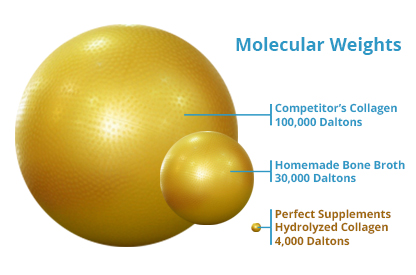
Hydrolyzed simply means that an all natural enzyme process is used to break down the very long chain triple helix collagen, into shorter chain Collagen Peptides. Why do this? Because shorter chain collagen peptides, with a lower molecular weight than gelatin or standard collagen is much easier for the body to absorb.
A typical competitor's collagen can weigh up to 100,000 Daltons while homemade bone broth has 30,000. Perfect Hydrolyzed Collagen has been 3rd party tested and weighs in at only 4,000 Daltons.
Cool, Can I Run to The Store And Buy The Cheapest Collagen?
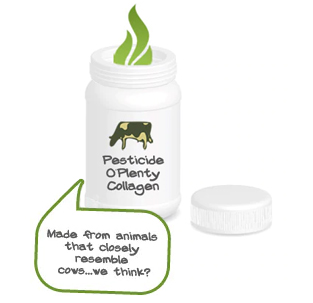
You certainly could… if you like hormones, pesticides and collagen of unknown origins.
Much like the hamburger you buy at McDonalds is not the same as the local, free range, organic beef patty you get at a natural food store. They are both called hamburgers, but there is a world of difference between the two products!
Some collagen is processed in such a way that the amino acids are destroyed. Some collagen comes from cows that have been fed an unhealthy diet. Some collagen comes from cows that have been pasture raised, but on glyphosate and pesticide laden fields! Other collagen powders and supplements have a very high molecular weight and are not easily absorbed into the body. The problem is, low quality collagen supplements can come in beautiful bottles with lots of flowery language on the label.
It sure would be easier if the low quality collagen came in bottles with warning signs.
The good news is, there are ways to supplement with high quality and easily absorbed collagen without all of these pitfalls.
Long Answer – How To Find High Quality Hydrolyzed Collagen
As you evaluate different brands of Hydrolyzed Collagen, here are the questions you are going to want to ask them…
Make sure to ask for lab testing and assays – make them prove it, not just say it!
Did grandma feed you GMO filled bone broth? Didn’t think so.
If it is, it will have this seal on it.
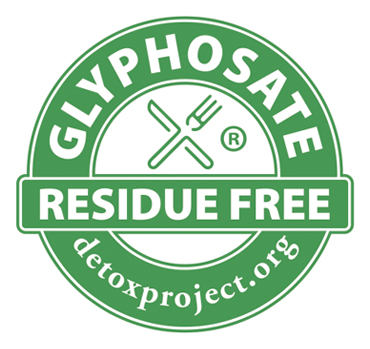
When you see this seal, you have peace of mind with "Independent 3rd Party Lab Testing on Each Batch of Finished Product, Publicly Displayed For All To See".

You will want to ask the company how the cows are raised and what they are feed. Remember, it is not – You are What You Eat. It is actually, You Are What Your Food Ate.
You are on a quest for high quality, hydrolyzed collagen – not magnesium stearate, rice, fillers or flow agents. KIPAS (Keep It Pure And Simple) ☺
There are various ways to break down collagen into collagen peptides using harsh chemicals. What you want is collagen that has been bathed in enzymes to naturally hydrolyze the collagen, much in the same manner our body breaks down and digest food.
As much as we love Hydrolyzed Collagen, we realize it is not for everyone. If you are not satisfied for any reason, you want to be able to return an empty bottle for a full refund.
Okay, this last one is not essential, but we do think finding a collagen that is produced by a company that is concerned about sustainability and climate change is a huge bonus!
Honestly, it is going to be tricky to get most companies to answer all these questions. It will probably involve a number of emails and calls and then waiting for them to produce the lab work and documentation. But as you are ingesting this, you have the absolute right to have all these questions answered.
There is a short-cut...
Only The Perfect Hydrolyzed Collagen Provides:
- 100% Hydrolyzed Collagen
- Sourced EXCLUSIVELY From Brazilian Pasture Raised (Grass Fed) Cows
- 100% Natural and Pesticide and Hormone Free
- Non-GMO, Lactose & Dairy Free
- Low Molecular Weight For Easy Absorption
- High Bioavailability
- Free of Pesticides, Hormones, Chemicals and Contaminants - Heavy Metal lab test
- World's First Certified Glyphosate Residue Free Collagen (learn more) - Full Lab Testing Right Here
- Contains Type I & Type III Collagen
- Easily Mixes in Any Liquid - Hot or Cold
- Lab Tested With Proof of Purity
- Backed By Our 100% Money Back Guarantee
- Silver Level Green America Certified Business
- No Fillers of Flow Agents - Just Pure Collagen
- 60 Servings Per Bottle, 660 gram container (approx. 1.5 lbs)
- Also Available In Convenient, Single Serve Packets! Learn More.
- Looking for Collagen That Gels? Try our Perfect Bovine Gelatin.
- The Only Collagen to Receive Perfectly Pure Certification (learn more)
Perfect Hydrolyzed Collagen – Others Say It, We Show It

We are not going to pretend to be objective, we make the Perfect Hydrolyzed Collagen, so clearly we love it ☺
But we are not asking you to take our word for it, head over to our Perfect Hydrolyzed Collagen page and spend some time on our Lab Test Tab.
Look at the Glyphosate Free and Perfectly Pure Certifications.
Take a look at our Heavy Metal testing.
Read over the objective results from the 9 Point Test of Quality.
In short, while others say they have a pure and effective Hydrolyzed Collagen, we show it!
But Does The Brand of Collagen Really Make a Difference?
We will let Free Range Diva explain why she loves our Perfect Hydrolyzed Collagen compared to other brands –
And then listen to what happened to her hair growth when she switched from another brand of collagen to the Perfect Hydrolzyed Collagen –
Is Taking Vitamin C With Your Collagen a Good Idea?

By pairing collagen with vitamin C, the body is able to make the most of its own internal collagen production. Vitamin C exposure has been shown to increase collagen and decrease elastin.
One of the most compelling arguments for the vital role for vitamin C in skin health is the association between vitamin C and a number of important skin functions. In particular, wound healing (associated with collagen formation), thickening of the top layer of the skin, and development of connective tissue morphology. Vitamin C acts as a co-factor for the proline and lysine hydroxylases that stabilize the collagen molecule, and it also promotes collagen gene expression.
In the skin, collagen formation is carried out mostly by fibroblasts in the dermis, resulting in the generation the dermal collagen matrix. In addition to stabilizing the collagen molecule by hydroxylation, vitamin C also stimulates collagen mRNA production by fibroblasts.
You can easily increase your vitamin C intake through your diet. Eating lightly cooked vegetables, fresh berries, and of course, citrus. You can also get extra vitamin C through supplementation, which for adults, the daily recommended amount is 65 to 90 mg. (www.ncbi.nlm.nih.gov)
How Will You Feel After Increasing Your Collagen Intake?
Better! As collagen plays such a crucial role in numerous bodily functions, giving your body a low molecular weight, bioavailable, and highly absorbable collagen will help improve your overall health.
Diets can be debated to no end, but I think we can all agree that the key to good health is to provide our body with the nutrients it needs to function, repair, and grow. Feed your body the fuel it needs and don't just treat one problem, you increase the health of your entire body.











